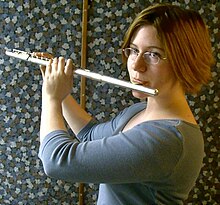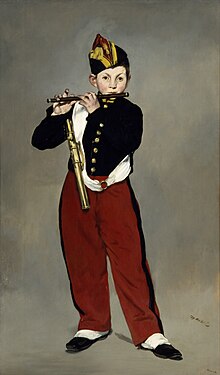Flautist: Difference between revisions
Fusion art (talk | contribs) |
|||
| Line 6: | Line 6: | ||
The choice of "flautist" (from the [[Italian language|Italian]] ''flautista'', from ''flauto,'' and adopted due to eighteenth century [[List of English words of Italian origin|Italian influence]]) versus "flutist" is the source of vicious dispute among players of the instrument. "Flutist" is the earlier term in the English language, dating from at least 1603 (the earliest quote cited by the ''[[Oxford English Dictionary]]''), while "flautist" is not recorded before 1860, when it was used by [[Nathaniel Hawthorne]] in ''[[The Marble Faun]].'' While the print version of the ''OED'' does not indicate any regional preference for either form, the online ''Compact OED'' characterizes "flutist" as an American usage.<ref>{{cite web | title=flutist | work=Compact Oxford English Dictionary | url=http://www.askoxford.com/concise_oed/flutist?view=uk | dateformat=mdy | accessdate=September 16 2005}}</ref> |
The choice of "flautist" (from the [[Italian language|Italian]] ''flautista'', from ''flauto,'' and adopted due to eighteenth century [[List of English words of Italian origin|Italian influence]]) versus "flutist" is the source of vicious dispute among players of the instrument. "Flutist" is the earlier term in the English language, dating from at least 1603 (the earliest quote cited by the ''[[Oxford English Dictionary]]''), while "flautist" is not recorded before 1860, when it was used by [[Nathaniel Hawthorne]] in ''[[The Marble Faun]].'' While the print version of the ''OED'' does not indicate any regional preference for either form, the online ''Compact OED'' characterizes "flutist" as an American usage.<ref>{{cite web | title=flutist | work=Compact Oxford English Dictionary | url=http://www.askoxford.com/concise_oed/flutist?view=uk | dateformat=mdy | accessdate=September 16 2005}}</ref> |
||
Richard Rockstro in his three volume treatise ''The Flute''<ref>Richard Shepherd Rockstro, ''The Flute'' (Fritz Knuf - Buren, The Netherlands, 1986[1890])</ref> written in England in 1890 uses "flute-player." |
Richard Rockstro in his three volume treatise ''The Flute''<ref>Richard Shepherd Rockstro, ''The Flute'' (Fritz Knuf - Buren, The Netherlands, 1986[1890])</ref> written in England in 1890 uses "flute-player." He also uses "fluteist" and the less popular "flutomater". |
||
The American player and writer Nancy Toff, in her ''The Flute Book'', devotes more than a page to the subject, commenting that she is asked "Are you a flutist or a flautist?" on a weekly basis. She prefers "flutist": "Ascribe my insistence either to a modest lack of pretension or to etymological evidence; the result is the same." Toff, who is also an editor for Oxford University Press [http://www.us.oup.com/us/information/editors/scholarly.popular/nancy.toff/?view=usa], describes in some detail the etymology of words for "flute," comparing ''OED'', Fowler's ''[[Dictionary of Modern Usage]]'', Evans' ''[[Dictionary of Contemporary American Usage]]'', and Copperud's ''[[American Usage and Style: The Consensus]]'' before arriving at her conclusion.<ref>Nancy Toff, ''The Flute Book'' (Scribners, 1985), "Flutist or Flautist?" pp. xiv-xv</ref> |
The American player and writer Nancy Toff, in her ''The Flute Book'', devotes more than a page to the subject, commenting that she is asked "Are you a flutist or a flautist?" on a weekly basis. She prefers "flutist": "Ascribe my insistence either to a modest lack of pretension or to etymological evidence; the result is the same." Toff, who is also an editor for Oxford University Press [http://www.us.oup.com/us/information/editors/scholarly.popular/nancy.toff/?view=usa], describes in some detail the etymology of words for "flute," comparing ''OED'', Fowler's ''[[Dictionary of Modern Usage]]'', Evans' ''[[Dictionary of Contemporary American Usage]]'', and Copperud's ''[[American Usage and Style: The Consensus]]'' before arriving at her conclusion.<ref>Nancy Toff, ''The Flute Book'' (Scribners, 1985), "Flutist or Flautist?" pp. xiv-xv</ref> |
||
Revision as of 23:58, 26 October 2009
A flautist, flutist, or flute player is a musician who plays the flute.
Naming controversy

The choice of "flautist" (from the Italian flautista, from flauto, and adopted due to eighteenth century Italian influence) versus "flutist" is the source of vicious dispute among players of the instrument. "Flutist" is the earlier term in the English language, dating from at least 1603 (the earliest quote cited by the Oxford English Dictionary), while "flautist" is not recorded before 1860, when it was used by Nathaniel Hawthorne in The Marble Faun. While the print version of the OED does not indicate any regional preference for either form, the online Compact OED characterizes "flutist" as an American usage.[1]
Richard Rockstro in his three volume treatise The Flute[2] written in England in 1890 uses "flute-player." He also uses "fluteist" and the less popular "flutomater".
The American player and writer Nancy Toff, in her The Flute Book, devotes more than a page to the subject, commenting that she is asked "Are you a flutist or a flautist?" on a weekly basis. She prefers "flutist": "Ascribe my insistence either to a modest lack of pretension or to etymological evidence; the result is the same." Toff, who is also an editor for Oxford University Press [1], describes in some detail the etymology of words for "flute," comparing OED, Fowler's Dictionary of Modern Usage, Evans' Dictionary of Contemporary American Usage, and Copperud's American Usage and Style: The Consensus before arriving at her conclusion.[3]
The first edition of the OED lists fluter as dating from circa 1400 and Fowler's Modern English Usage[4] states that "there seems no good reason" why flautist should have prevailed over fluter or flutist. However, according to Webster's Dictionary of English Usage,[5] flautist is the preferred term in British English, and while both terms are used in American English flutist is "by far the more common choice."
James Galway summed up the way he feels about "flautist," saying, "I am a flute player not a flautist. I don't have a flaut and I've never flauted."[6]
Notable flautists

Notable jazz flute players
Notable progressive rock players include
Notes
- ^ "flutist". Compact Oxford English Dictionary. Retrieved September 16 2005.
{{cite web}}: Check date values in:|accessdate=(help); Unknown parameter|dateformat=ignored (help) - ^ Richard Shepherd Rockstro, The Flute (Fritz Knuf - Buren, The Netherlands, 1986[1890])
- ^ Nancy Toff, The Flute Book (Scribners, 1985), "Flutist or Flautist?" pp. xiv-xv
- ^ Fowler's Modern English Usage (Oxford University Press, 1965) "flautist, fluter, flutist" p. 201
- ^ Webster's Dictionary of English Usage (Merriam-Webster Inc., 1989), "flautist, flutist" p. 452)
- ^ "On the first day of Christmas my true love asked of me..." Christmas quiz, Observer Magazine
- ^ USC Thornton School of Music : Faculty Profiles: James Walker
